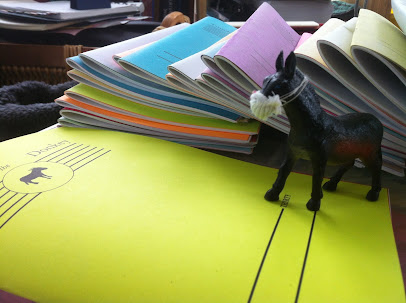
Emma Tilley’s writing has been published in Popshot Magazine, The Anti-Languorous Project, EVENT, and Poetry is Dead. Her debut chapbook Carp Dime was published by Rahila’s Ghost Press in 2019.
Her poems “SNOW GLOBES” and “HOMEBOUND” appear in the thirtieth issue of Touch the Donkey.
Q: Tell me about the poems “SNOW GLOBES” and “HOMEBOUND.”
A: “SNOW GLOBES” is about living in the bubble of a small town and not wanting or knowing how to grow up. “HOMEBOUND” explores the idea of being in an unhealthy relationship and trying to control that which does not belong to us, or anyone really.
Q: How do these poems compare to some of the other writing you’ve been doing lately?
A: At the time the poems were written I was doing a lot more persona poems by making up a character or a situation and exploring it. The same can be said now too, but I am learning to write more from my own experiences and be direct. The subjects overlap in some ways, but it comes with a whole different set of emotions for me when writing and revisiting them. I am also finding myself working on sets of poems with a shared theme that connect with one another more so than individual poems.
Q: Are you finding your poems are interacting with each other more than they had previously? Might this have been since you published your chapbook, possibly? Has the way you see your poems evolved at all since you published Carp Dime?
A: I think my poems are interacting with each other more than they had previously. The poems in Carp Dime came about after discovering how much I loved the prose poem. I was having a lot of fun coming up with a line or a pun and then seeing where it would take me. The process was very lighthearted and organic, and it wasn't until I reread the poems during the editing stages that I began to see more themes in them. These days I find myself wanting to be more structured so that I can put together a longer collection of poems that follow a cohesive theme. I think it helps keep me focused on the work at hand. It also helps me see more clearly the different phases of my life and where I was at when I was writing the work. Since publishing Carp Dime, I have become more critical of the work (or lack of) that I have been producing so the way I have seen my poems has changed. I am trying to rediscover what it means to write for myself and how exciting exploring on the page can be.
Q: Do you have any models for the kinds of work you’ve been attempting? What writers or works are in the back of your head as you work?
A: Nancy Lee’s What Hurts Going Down, Lorna Crozier’s God of Shadows and Dina Del Bucchia & Daniel Zomparelli’s Rom Com have all been in the back of my head recently. I would say the imagery, story, humour, form, and characterization within their works as a collective have served as great models for the work that I have been attempting and trying to branch out with the kinds of poems I am writing.
Q: With a chapbook published and your current works-in-progress, how do you feel your work has developed? Where do you see your work headed?
A: I think it’s becoming more authentic to who I am, and I am also taking more risks as I go. The more I learn about poetic form, the more I am trying to see what I can push myself to do. How I can grow and develop with each phase of writing. I see my work growing and exploring more topics that I would have shied away from before. I can only hope that the work evolves in ways I never even would have imagined which is both motivating and exciting.
Q: How do you see those risks revealing themselves? Are you leaning more in a structural direction, with the language or the line, or are you seeking out different areas of subject matter?
A: I see the risks revealing themselves in the kinds of projects I undertake and the ideas I come up with. I’m interested in looking at poetry beyond the page at some point and I think what I’m learning now paves the way for that. It’s also about giving myself permission to try and fail which is something I’ve always been very critical about.
I’ve noticed myself in a bit of a rut lately when it comes to line and structure. There are times when I feel like all the writing sounds the same and looks the same. 2020 was a crash course in grief for me and it’s pushed me to write about subjects that I normally would have been too scared or unsure of how to talk about. It’s also taken up a lot of brain space that would usually be used to explore new ideas and concepts. I’m trying to find the balance again.
Q: Finally, who do you read to reenergize your own work? What particular works can’t you help but return to?
A: If I need a reminder to bring humour back into my work, I would look to Fredrik Backman or Louise Rennison. Humour is important to me in both my life and my writing – it’s nice to find the right balance for it. Some works that I return to would be Lorna Crozier’s The Book of Marvels: A Compendium of Everyday Things and Diane Schoemperlen’s Forms of Devotion. They always draw me back in and every time I read them I discover something new.
No comments:
Post a Comment
Note: Only a member of this blog may post a comment.